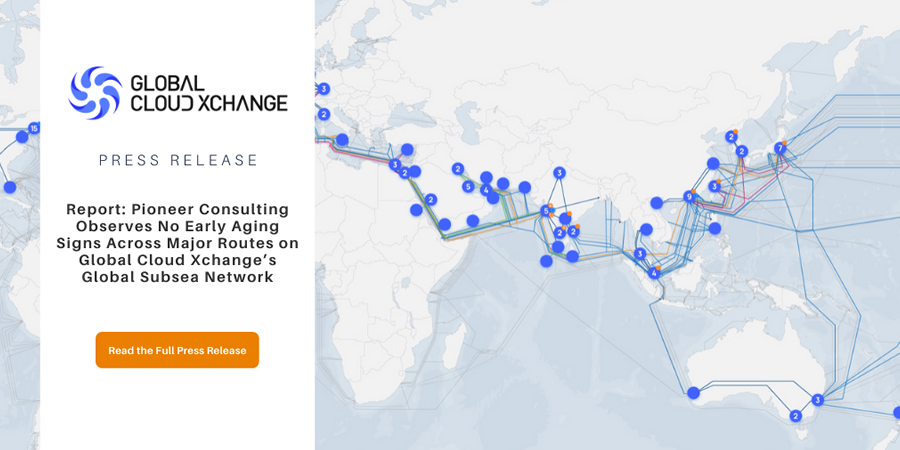Global CloudXchange announced key findings from a Pioneer Consulting report evaluating the service life of its global subsea assets. GCX owns and operates a network spanning US, Europe, Middle East, India, and East Asia over subsea systems that include FA-1, FNAL NACS and WACS, FALCON and HAWK. With standard subsea supplier lifespans of 25-years, Pioneer’s thorough evaluation cites at least five more years on GCX’s oldest operating systems, plus longer life at increased capacity available for the foreseeable future.
“The results of Pioneer Consulting’s report is great news for our business and strategy, enabling Global CloudXchange to plan well into the future,” comments Carl Grivner, CEO of Global CloudXchange. “As the demand from Over-The-Top (OTT) applications increases, we offer access to diverse and redundant routes, fully operational today, by continuing upgrades to support the ongoing surge in demand. This capability offers many more options to companies, particularly in hard-to-reach markets like the Middle East.”
"Pioneer Consulting is delighted to have worked in partnership with Global CloudXchange. This important work provides valuable strategic insight about the technical condition of these critical subsea cables," said Iain Ritson of Pioneer Consulting. "The obsolescence lifespan of subsea cable systems, once routinely assumed to be 25 years, has become a sliding milestone. Since the mid-1990s, we have seen successful upgrade programs increasing capacity well beyond the originally planned system life. We are proud to provide trusted counsel about the viability of these assets."
With many aging subsea cable systems providing vital data connectivity across the world, companies like GCX are operating these systems to foster a strong commitment to ongoing service excellence. As more subsea cables are deployed and under construction, the shift to private-ownership versus open cable systems or consortium-led initiatives makes access to newer systems both complex and costly. Extending the life of systems with thoughtful approaches to deactivation are key considerations, particularly for companies who operate and manage these important pathways.
GCX commissioned the report from Pioneer Consulting to both identify areas for improvement and allay potential concerns for customers seeking both short-term and long-term subsea connectivity solutions.
The report cites GCX’s long lifetime of its systems, made possible by:
●Careful design of the submerged equipment (ultra-reliable optical repeaters with carefully-qualified optical components and redundant optical pump sources),
●Planning of ‘high-quality,’ safe and secure marine routes (e.g., avoiding anchoring and heavy shipping areas),
●Selection of the correct level of mechanical protection for the cable (e.g., double armored cable design in very shallow waters),
●State of the art installation of the submarine cable on the seabed (e.g., burial, post lay inspection, and additional mechanical protection on the shore ends if required), and regular maintenance.
The report identified that while some GCX systems leverage manufacturing solutions that are no longer supported, the company’s reserve of spare parts including repeaters, pumps, equalizers, and other important subsea components are more than ample to support ongoing repair requirements if needed - a report highlight was that to date FA1 and FNAL have not suffered a submerged plant component failure. The report further states that no major degradation of service has been seen on the systems analyzed, and a proactive monitoring and management plan will keep these systems operating at their optimal levels for the foreseeable future.
The report notes: “despite the uncertainties, the trans-Atlantic route will continue to require large capacity growth in the future (at about 37% CAGR between 2020 and 2026).” Key factors citing GCX’s strengths are its transatlantic landing stations in the US, France and the UK - all owned and operated by the company. The dark fiber backhaul in these locations are also owned and operated by GCX, enabling diverse connectivity to key city Points of Presence (PoPs) in New York, Paris and London, with extended reach to Amsterdam and Frankfurt fully managed and enabled.
In addition, GCX’s position in the Middle East recognizes the strength of the FALCON system, which provides the first protected Gulf Loop, serving as a key thoroughfare and extension of traffic between India and the Middle East. Various existing branching units via HAWK, serving the Mediterranean, provide an important interconnection and network extension capability of GCX’s global network span. Further differentiating the company’s network is the FEA Suez Canal crossing, providing GCX a strong service enablement capability across the Red Sea and Indian Ocean.
GCX continues to strengthen its market position through operational integration of the company’s global assets. The company is building a unique globally accessible Cloud ecosystem further leveraging its subsea assets where customers can create, manage and connect their networks throughout the world. The new management team at GCX is committed to realizing this vision, expanding the company’s growth strategy through both organic and inorganic initiatives. The next phase of GCX includes its commitment to maintaining its financial strength while prioritizing sustainable growth.










